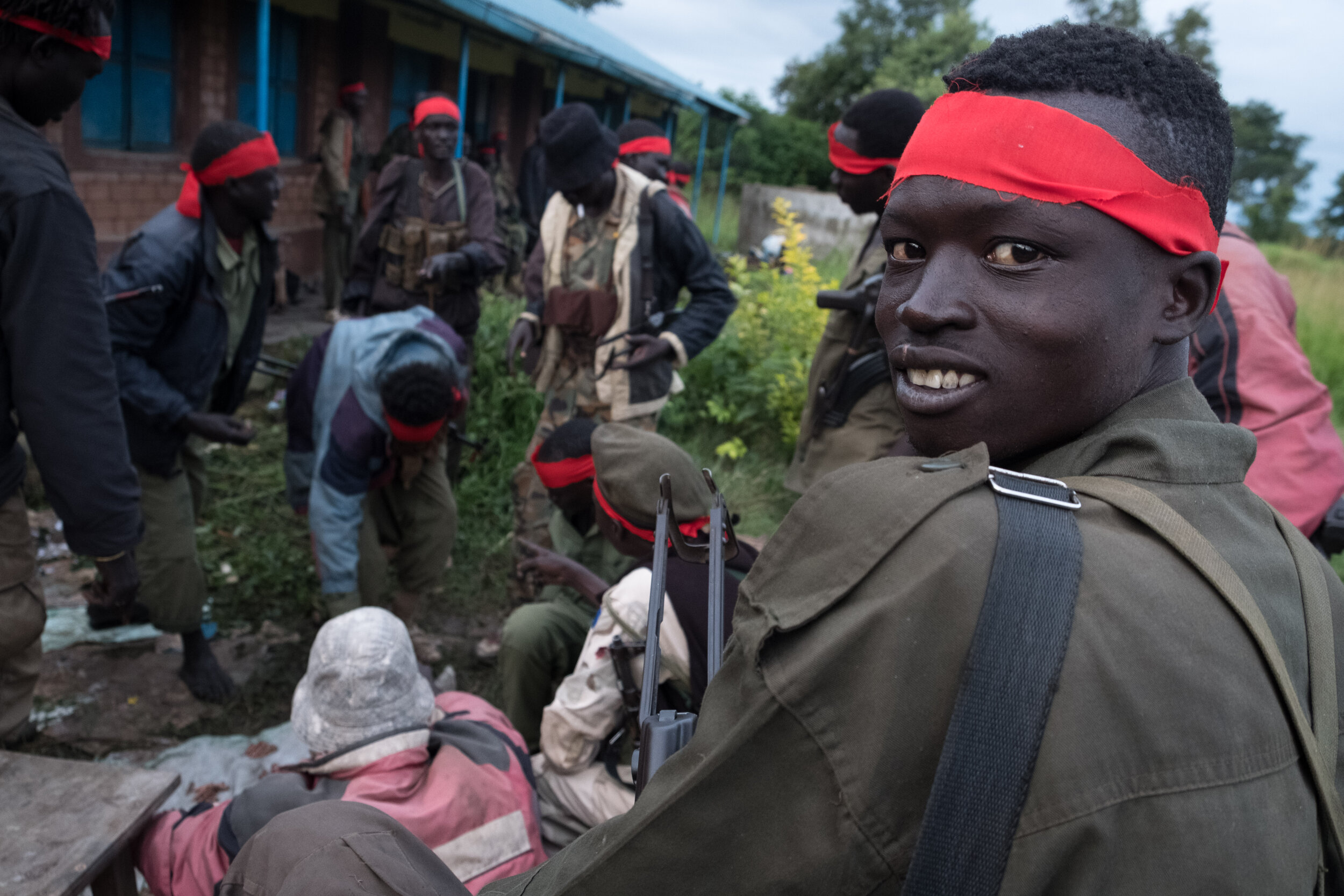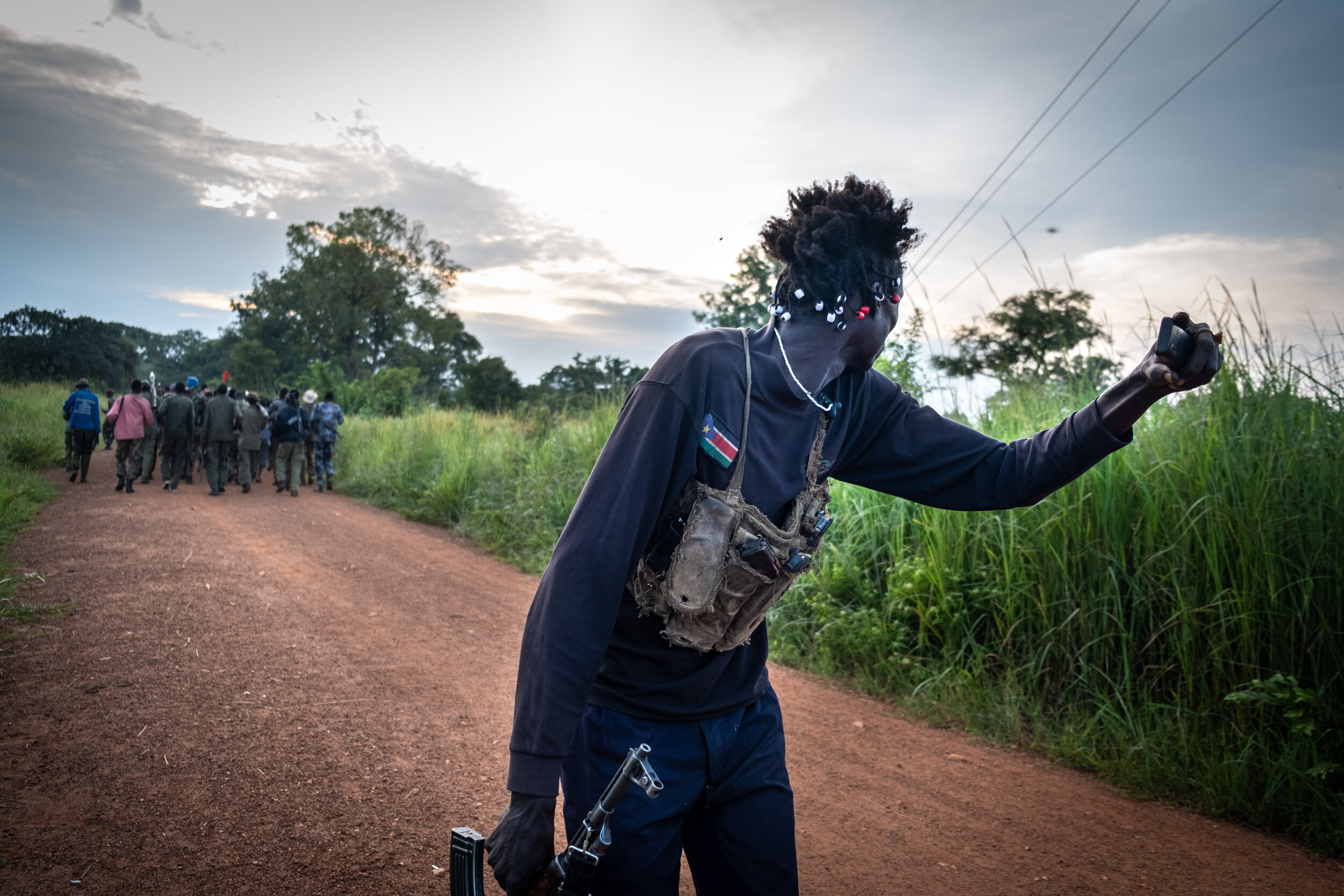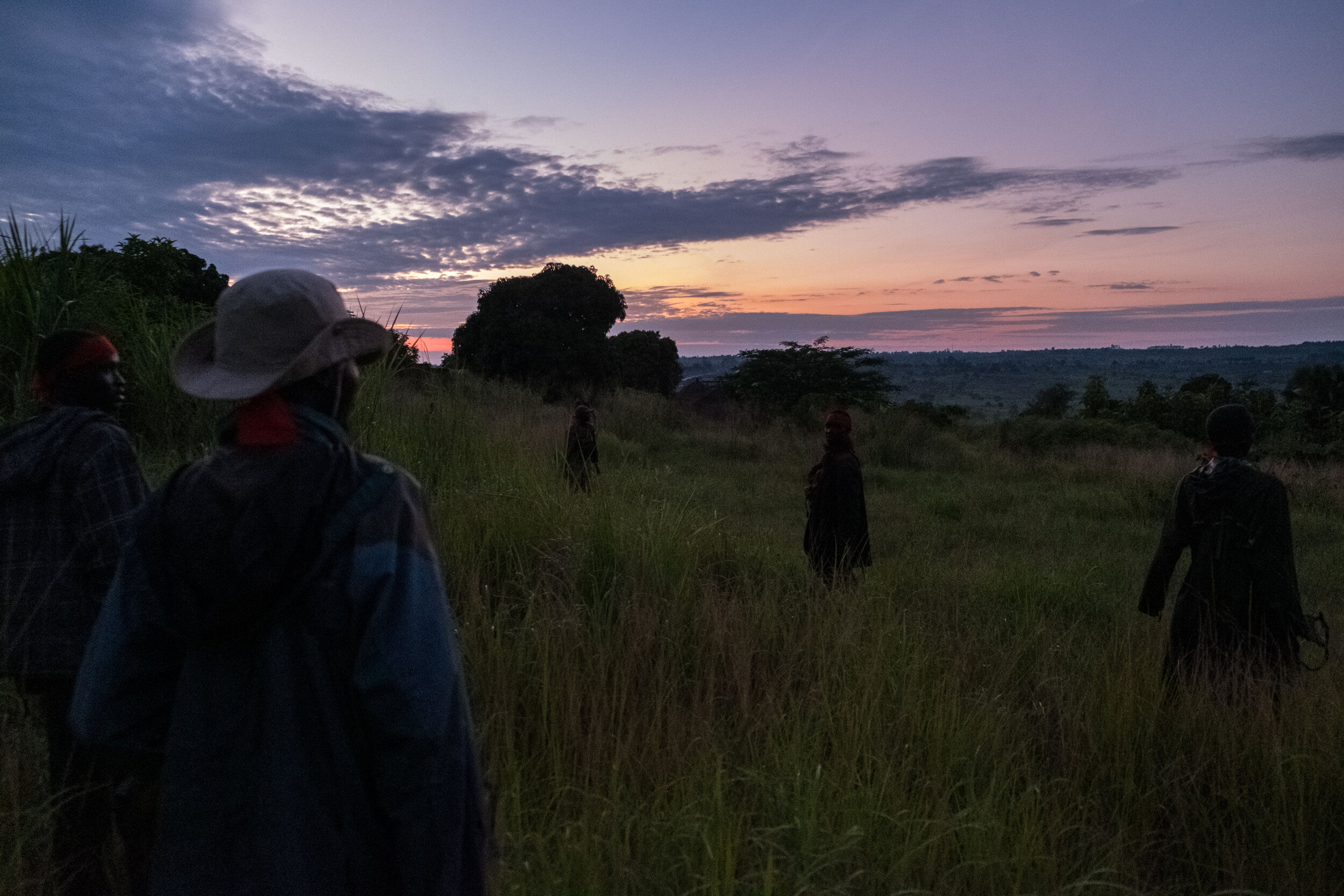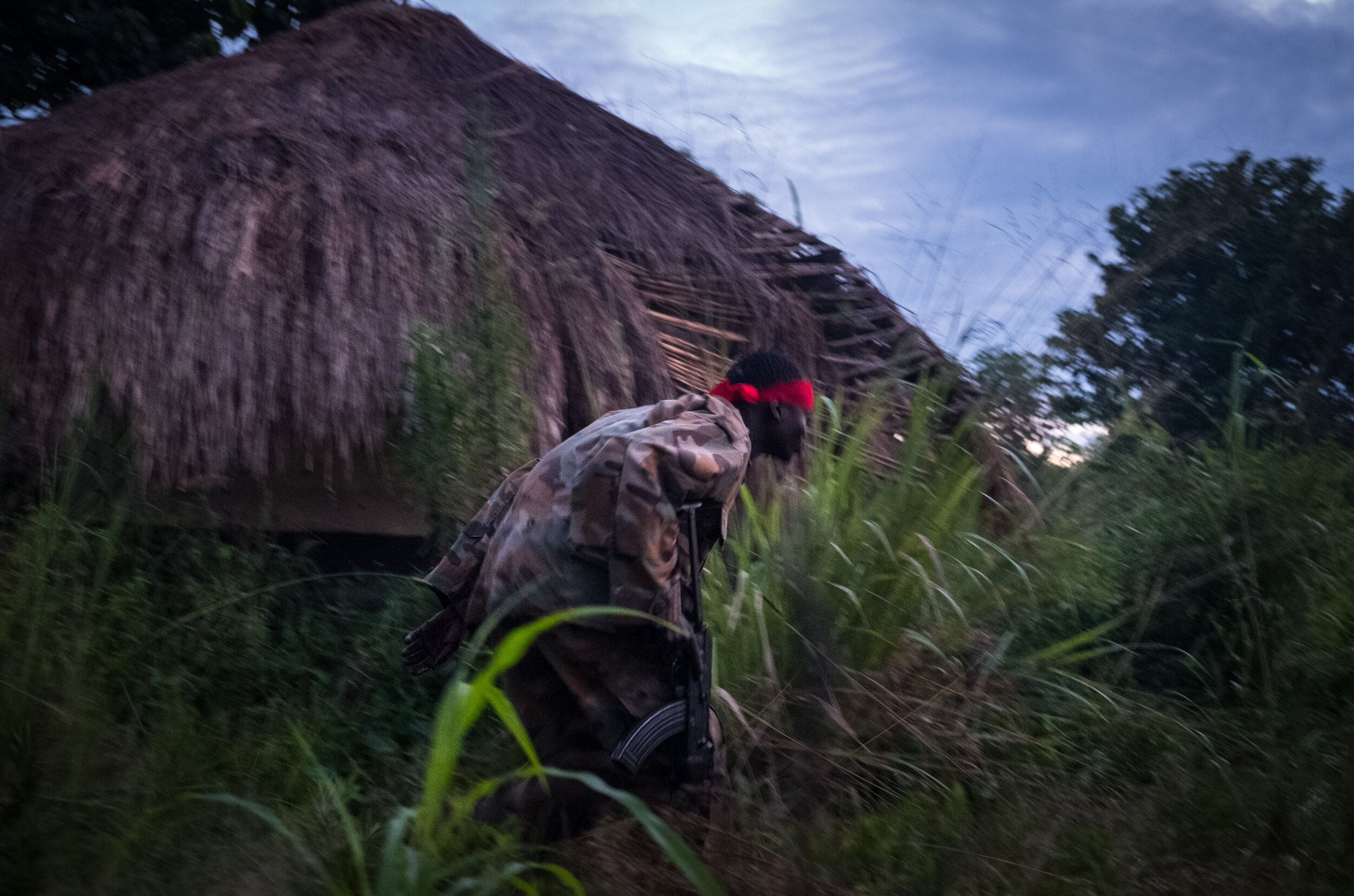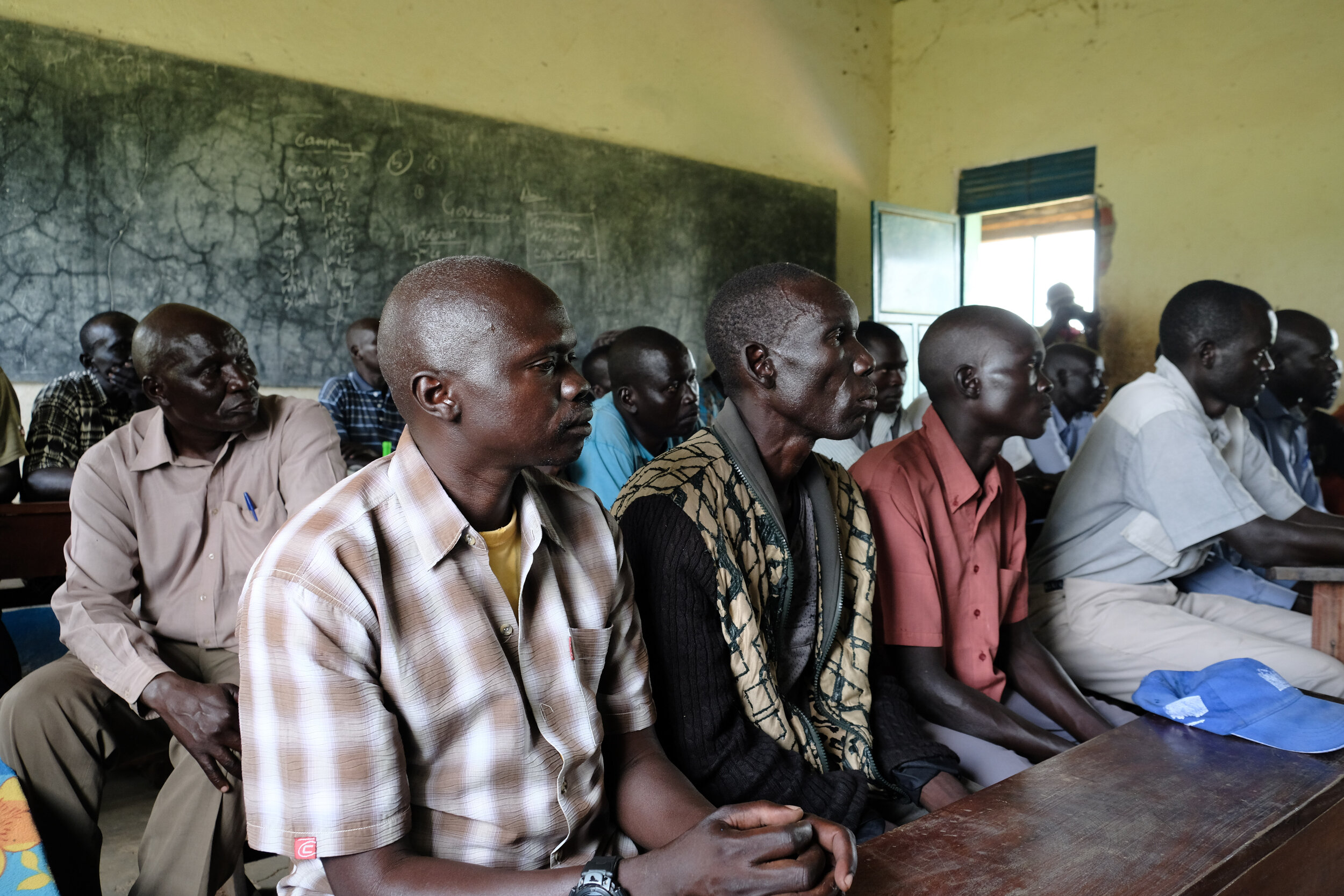
Exploring the civil war in South Sudan - August 2017
South Sudan
Transcribed from a handwritten letter
South Sudan, 18-22 August 2017
“I arrived in South Sudan only a few days after flying from Ukraine, but it feels likes ages ago. The contrast between the outside world and this place that I find myself in is stark – and makes Europe feel very far away in time and space. This feeling of a great time having passed is magnified by the lack of activity here and the perpetual sense of waiting.
As soon as we left Kampala, I had the sense of moving progressively back in time - Here, we are living in mud huts with thatched roofs, the cooking is all done by women over an open fire, men hunt with bow and arrow, a wife costs between 70 – 150 cows, villages are connected by winding footpaths overgrown now during the rainy season by bush and grasses taller than us, streams are traversed by ad hoc bridges constructed of branches and vines. The traces of the outside world are few – old clothes, plastic jugs, wells drilled by volunteer groups, the occasional Chinese motorcycle – and that’s it. In one village deep in the bush where a woman cooked chicken over the fire, a man sold meat to passers-by (it was on a through-path to a market) and men ate under a thatched roof in the shade.
Our days are largely empty and unstructured and there is little to do in the town Panyume, and the village Iandu in which we have stayed. Panyume is a desolate little town deserted except for one merchant who sells biscuits, tobacco, soda and peanuts. Everybody else has fled deeper into the bush or to refugee camps in Uganda. Nobody from the rebels can afford any of the merchants’ goods, so most of them stand around this table just looking and talking. It’s dry and dusty here except when it rains, which it does regularly with huge claps of thunder that sound like artillery and heavy, short downpours. The sky is so big and open that you can watch the clouds race over.
The most difficult and frustrating thing about all these words though, is actually getting the truth out of them, which is, it seems, very difficult.
The weeks haven’t been completely empty though. I’ve seen rebels set up a local government, I’ve marched deep into the bush with them, I’ve watched them parade through town. These parades involve 100-130 men who wear an odd assortment of sandals and old running shoes, used western clothing and old SPLA uniforms (the army from which they defected). They are decidedly motley group marching behind the South Sudan flag with a guy with a homemade trumpet singing songs of victory and war in these heavy, earthy tones and waving their Kalashnikovs in front of them (mimicking the act of shooting). It seems to galvanize the men, but I’m not sure it would put much fear into any sort of well-trained army (though the gov’t forces aren’t very professional either, from what I hear). Still, it’s a quite an event, moving and powerful; it’s timeless, almost ancient. But enough about me…”
5-8-2017- near Kajo Keji South Sudan
Brigade Commander: Moses Lokujo Gabriel near Kajo Kejitall, strong, leaned back commandingly on a chair behind a bright blue plastic table as his motley collection of men file in behind him. He’s wearing his beret + 3-star epaulets, and SPLA uniform.
“These are officers and politicians passing through our training ground… Politically we have won the war… our motive is to change the system of governance of the country.”
“The problem of South Sudan is happening in everybody’s head”
You are not officers of Kajo Keji or elders of your region, you are officers of South Sudan (they applaud). IO cannot fail, we are progressing and can take the government of Silva Kirr. The time we should have a dialogue is not this time… We are not dialoguing anymore.” He says to his new officers and politicians. Security is the strength of our movement. Don’t mix business with politics. Good governance begins from you… You have to start from your home”
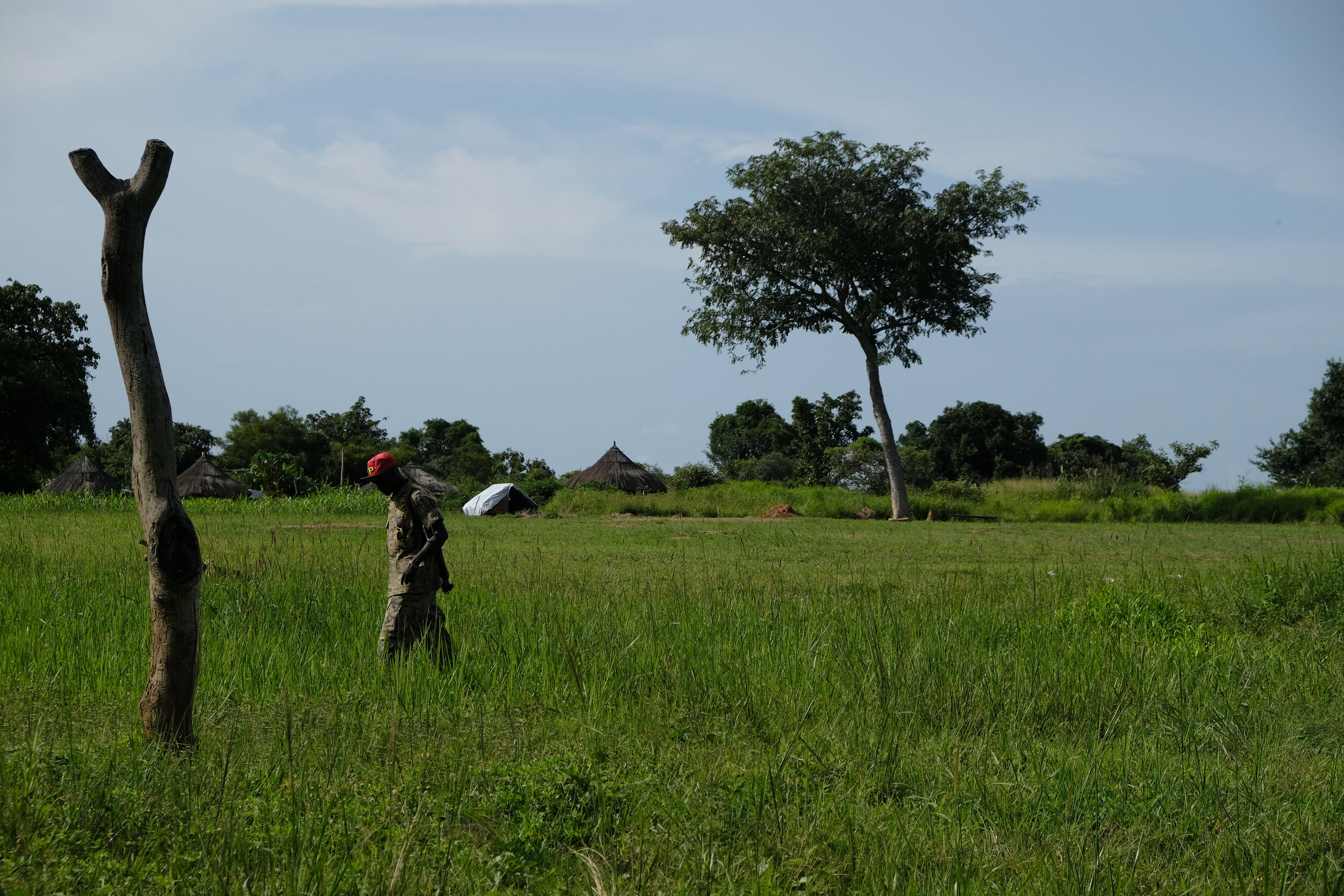
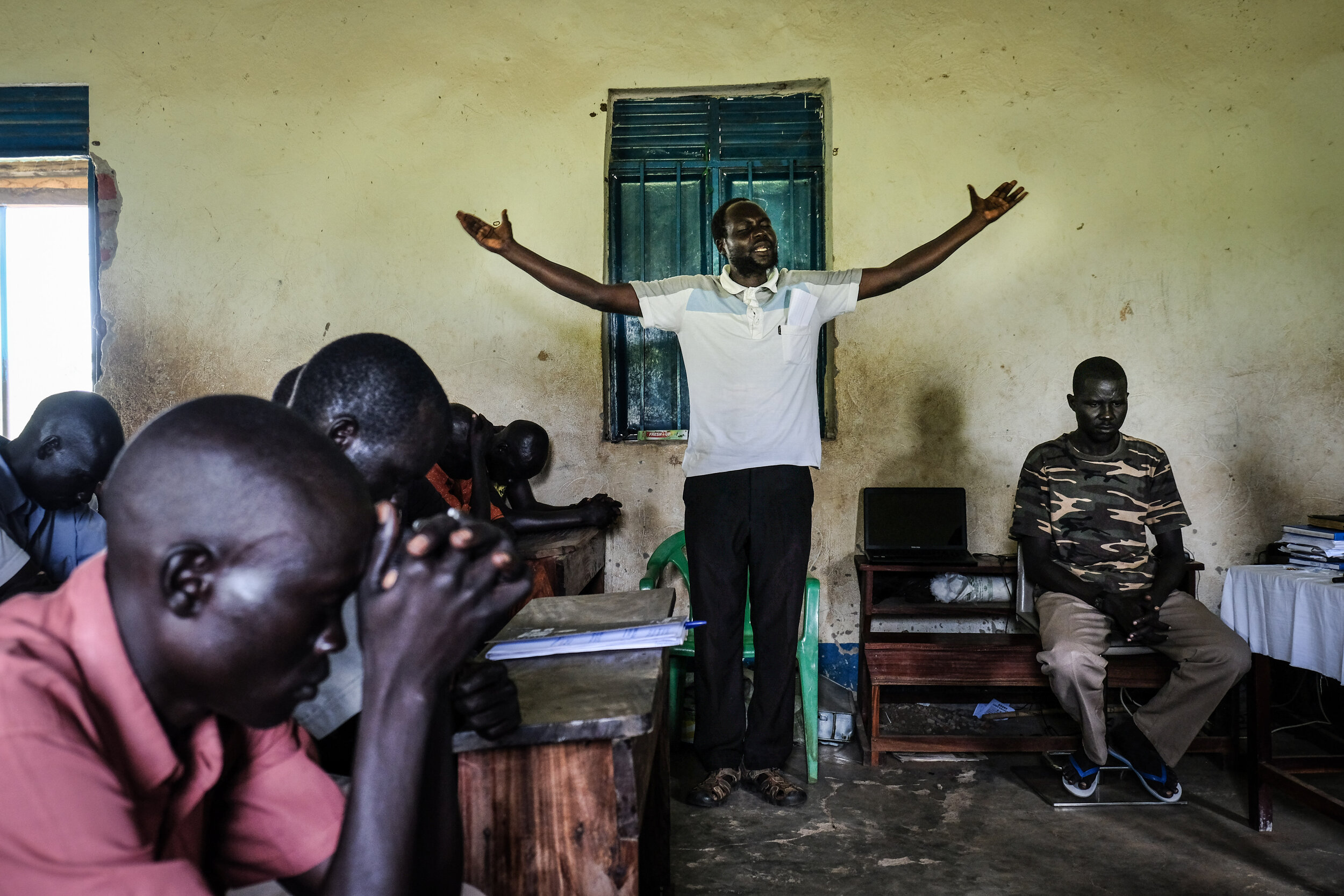
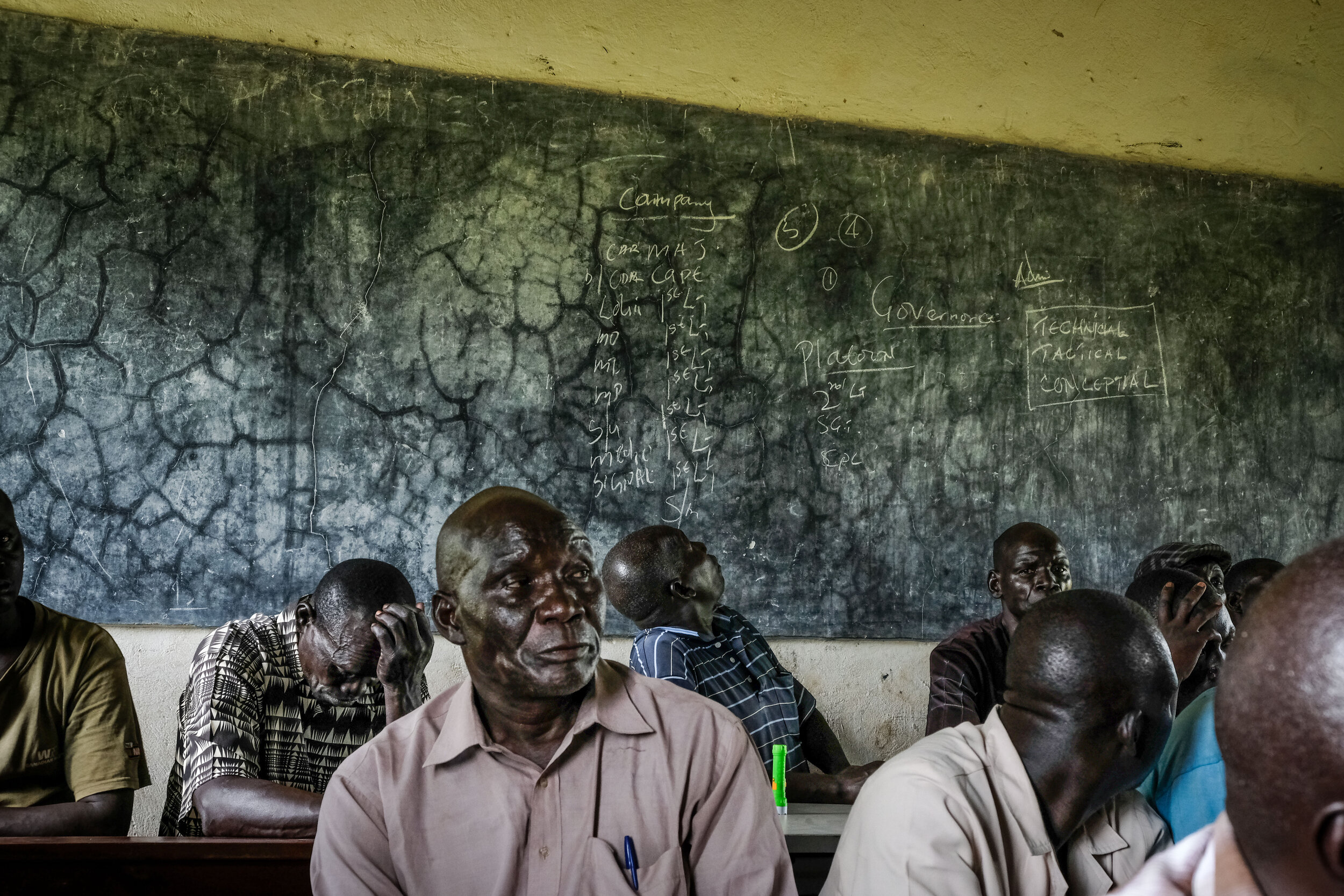
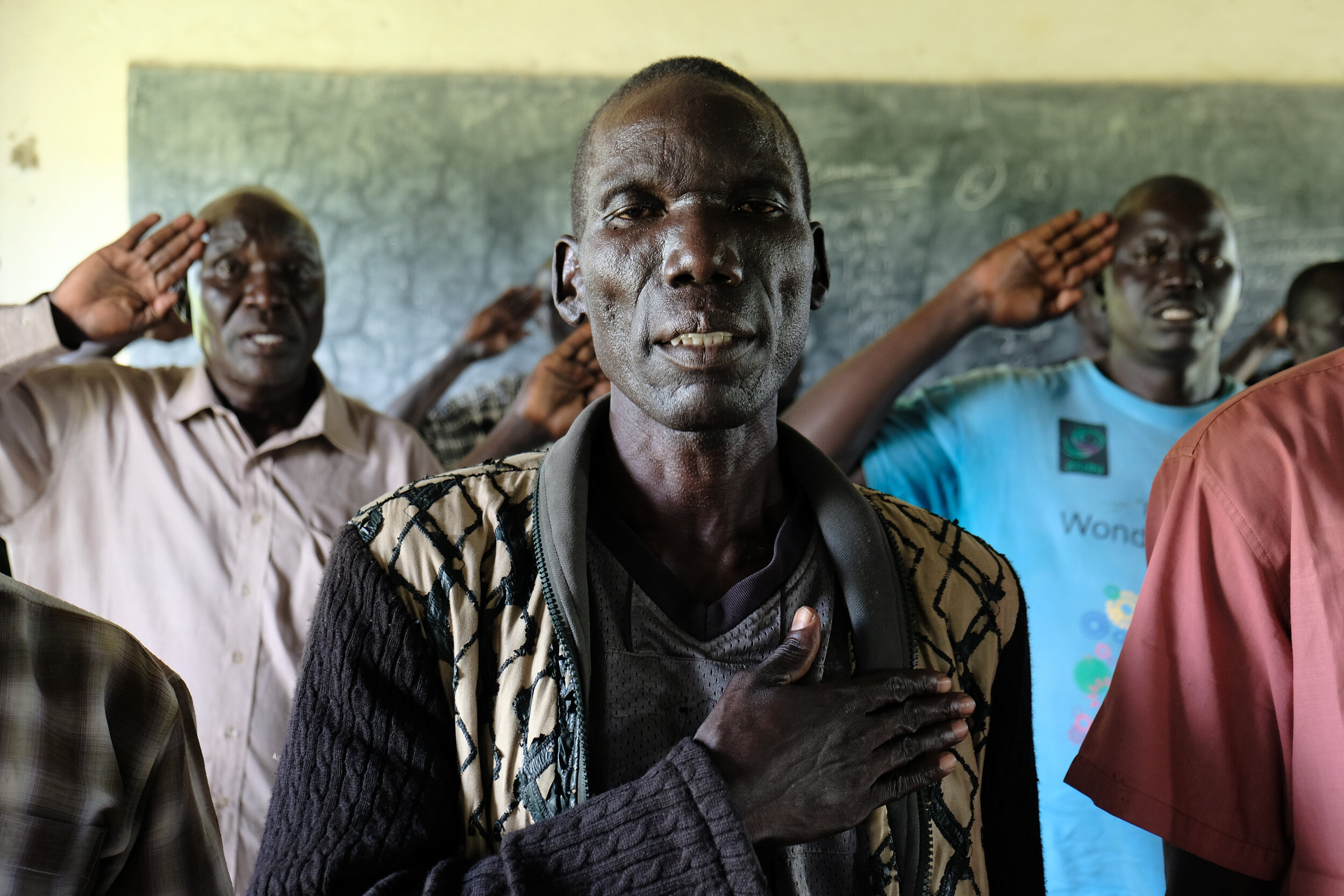
“The first civilians killed by the soldiers of Salva Kiir were killed in my village. That action provoked many people to join SPLA-IO. That was the gov’t we fought for and in the end, they turned their barrels back at us.
— Muryi Alex, member of IO, born in this area near Kajo Keji
“The reason we picked up arms - we need reforms… The system, rule of law, it’s left us annoyed, and with no options except to pick up arms and fight.”
- Samson, SPLA-IO, commissioner for Lainya county
On the road to South Sudan
5-8-2017
I am struck by the thought that this is still a very organic place where life is still connected very much to the earth itself. The houses are built from mud extracted from the local riverbank and from wood and thatch. The diet is almost completely locally grown. The people are subject to the capriciousness of their surroundings. Famine, sickness and war, which seems to be a perpetual and organic product of life here. The people seem like they could just melt back into the earth, the houses as if they could collapse and decay and be overtaken by vegetation, the roads as if they could be instantly swallowed up by the bush, by the dirt which covers them and the vegetation which encroaches everyday.
This is an ancient place.
The stillness of the night, the men who sit around campfires talking late in hushed tones, the perfect quiet of those moments before dawn, the stir of men’s voices, that moves from house to house and slowly envelopes the village, as they ready themselves for the march.
— Chris’ field notes, 5-8-2017
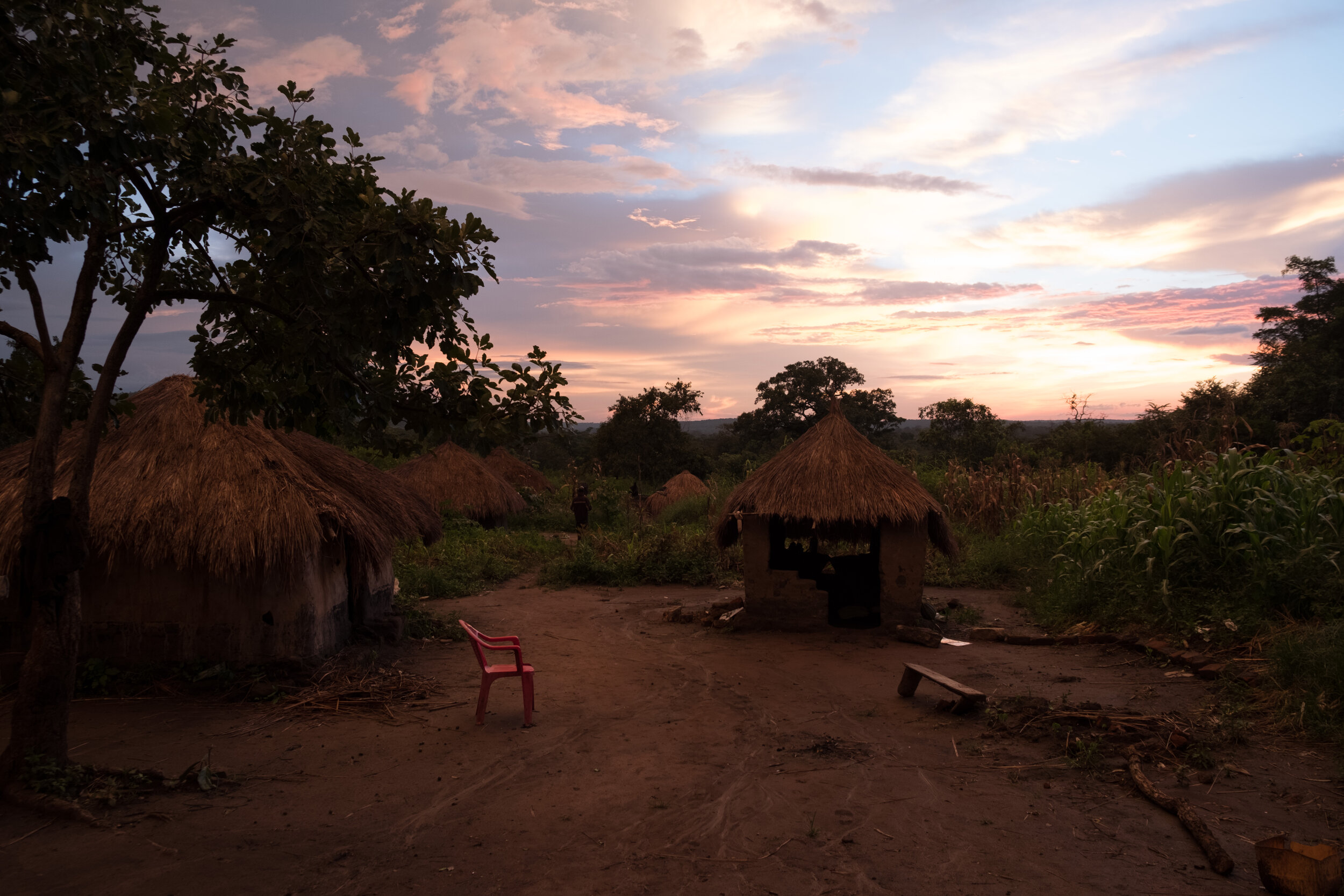
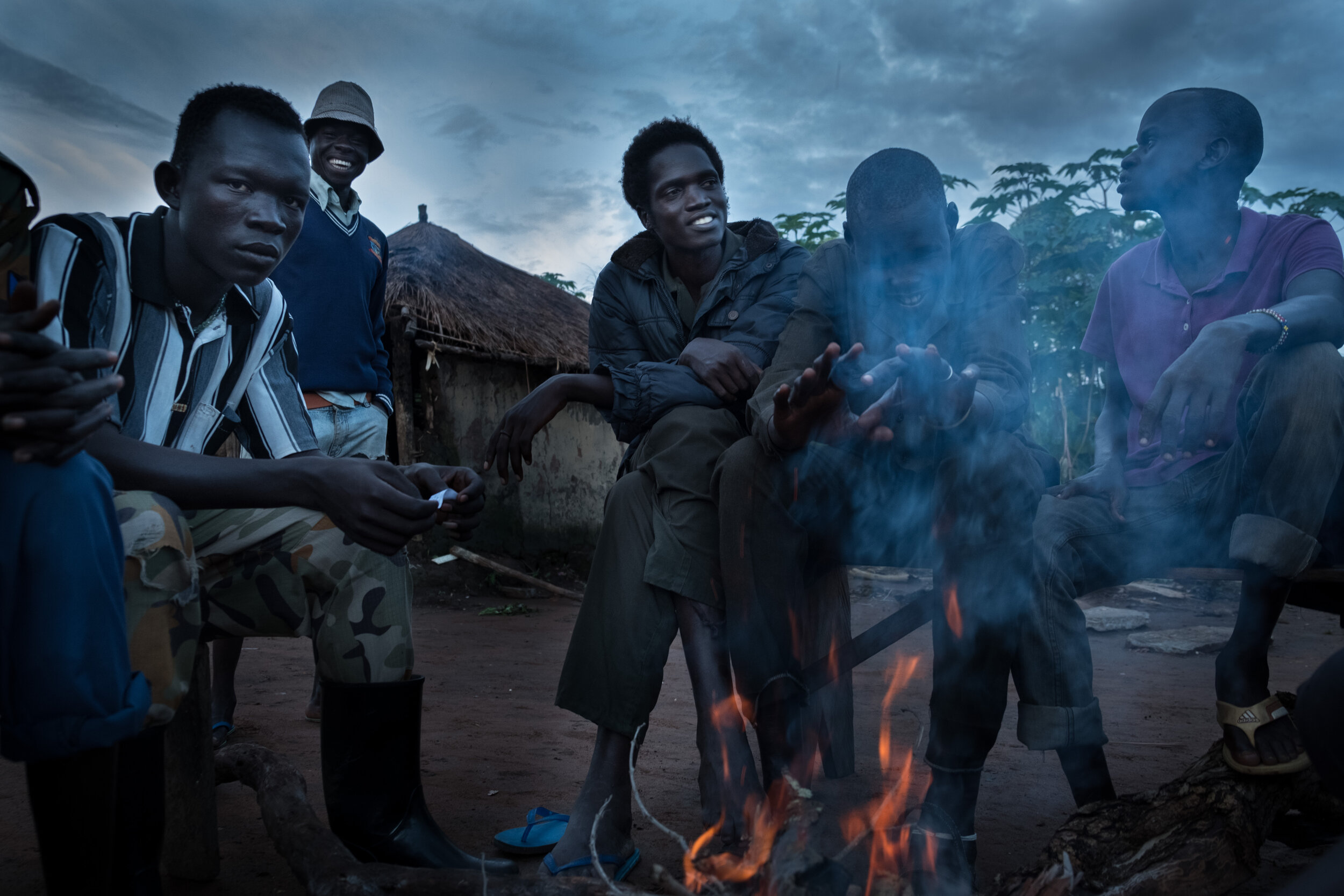
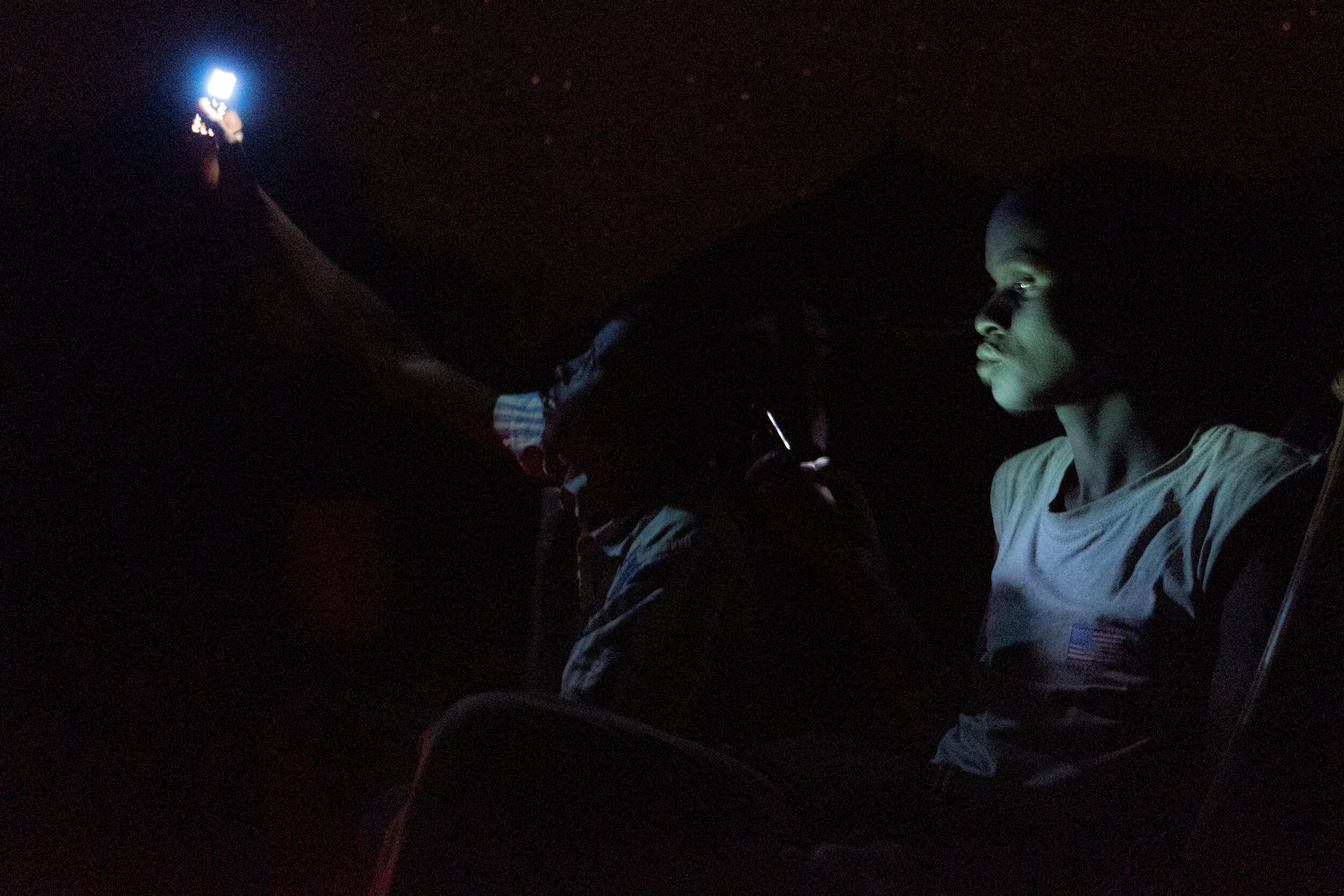
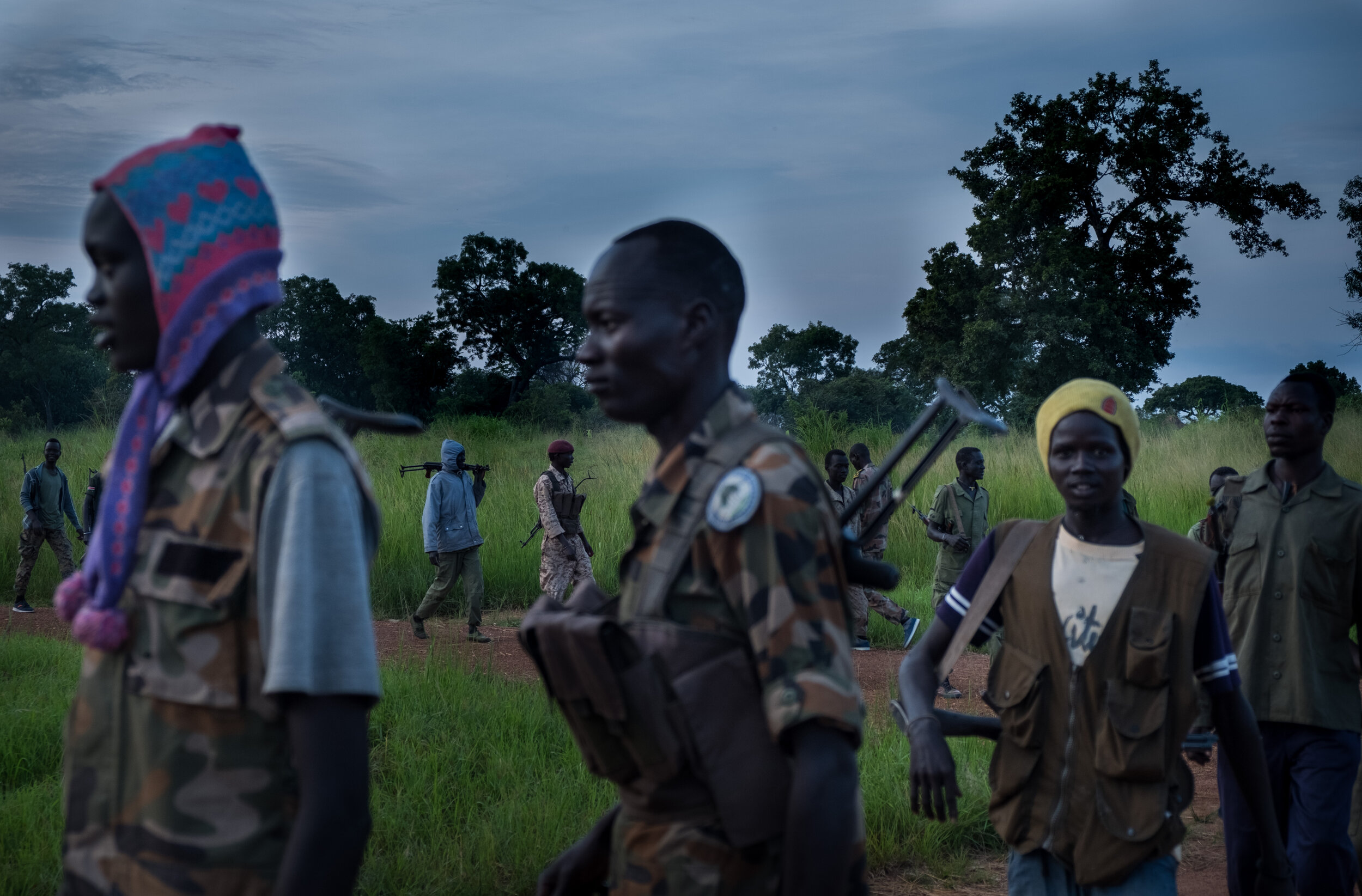
“There is no good life for guerillas. There are a group of young boys here, their uniforms are ill-fitting. “They are orphans”
Adjokeni says “Their parents were killed by the government.”
5-8-2017
Life is powerful here – during the day there are the sounds of people talking in the little villages, a cacophony of animal noises that blend together – dogs fighting, birds, insects. Vegetation grows large and rapidly, the human population all seems so young.
And yet, what happens to the old? Where are they? Dead mostly, I suppose. And this is the other side: death seems a very close counterpart to life here. Difficult living conditions, war, famine, sickness and death is never so far away. Villages burn or are abandoned. The crops are harvested (or not, if there’s a famine). Despite existing here for so long, civilization seems temporal & transient. Latori Adjokeni told me that one 80 year old soldier was so strong and healthy “because he grew up in a time of good maize.”
In the morning, the soldiers stir and murmur; a whistle blows for them & gather. In the center of this small decaying town, about a hundred poorly young men have gathered with all their belongings, a few carry plastic chairs.
“He’s carried that chair all the way from Juba”, Juma said, “he feels like a king in that chair.”
Some are dressed in the uniform of the SPLA, the army from which they defected, but they’re looking awfully ragged now. Others are dressed in civilian clothes, most wear sandals or sneakers in a poor state, most carry backpacks in various stages of falling apart. Some carry pots. They gather in small groups in the town and talk eagerly. As they set off, some sing and chant, most others are quiet, concentrating on carrying their loads. They will sleep in the bush; we’ll catch up with them tomorrow.
“If it weren’t for this war, many of us would be in school”, said one soldier from Yei on back of a truck.
Panyume feels stuck somewhere between prehistory, the wild west, and the digital age. Here, small mud huts with thatched roofs have been appropriated by a gang of young rebels carrying Kalashnikovs. Down the center of the village runs one road of orange dust or mud, depending on whether it has rained that day. At one end is a tall red and white cell phone tower – a reminder of the 21st century. It has, however, been turned off by the government in Juba and now the soldiers and a handful of civilians have to rely on access to the networks in Uganda, less then ten miles away. Facing it are a dozen decaying frontages, some locked now, others destroyed all abandoned by the civilian population that once lived here. Before the early 2000s, when this road, financed by the World Bank, was constructed, the small clusters of houses and villages here were connected only by narrow footpaths. Some civilians, fleeing the fighting, have gone back to the bush at the foot of the mountains in the distance, where they have taken to growing crops and surviving off the land, something they’d been doing here for millennia.
Panyume’s two churches are empty now. So too is the school. The small military compound with an eagle on its front has been left, occupied now by soldiers from the SPLA-IO. The only civilian building still in use is the “hospital” if the word can be extended to include the simple two room concrete building providing only the most basic of care to the soldiers and civilians here. The medium of care that is provided is so insignificant, that soldiers ask for my antibacterial crème and ibuprofen and chew local roots to stave off malaria.
Panyume exists in an ocean of bush at a fork in the road near the entrance to the city, sign says, “An Open Defecation Free Zone”
The men march in the morning the whistle blows repeatedly. One hundred men in mismatched uniforms march through the town. They sing victory songs in steady rhythm with deep earthy voices.
They shuffle through town, feet out of step. They walk and slap their Kalashnikovs and swing them in front mimicking gun powder. The group divides into two of each singing different songs. It’s solemn but celebratory setting up a new government in a grove of trees. “This is government in the bush”, said Juma.
“We are nationalists and what we’re doing here is for the good of South Sudan” said one IO member.
“Don’t have any fear” he said. “In Africa, liberation starts in the bush and goes to the urban areas” says a man in a suit speaking at the meeting, the leader of the organizing committee — Zakaria Amuleh Matayu
They’ve taken pews from the church, desks donated by UNICEF to the school, and plastic lawn chairs and assembled them into a circle beneath the trees.
Quotes from the conference in the bush by Frank Matata
“The whole number of troops we came to here from Juba was 1,370. And they came without artillery… You can imagine the risks we took”
“We are for the people because the people created us”
“A government that is killing its own citizens, that is corrupt, that has lost its vision – where is the legitimacy? A government that is being run under ethnic dimensions – where is the legitimacy?”
“What we are fighting for is freedom of the people and we are fighting for that freedom here in the bush before we take it to the cities.”
The meaning and the words themselves seem disconnected, leaving the outsider lost on a sea of uncertainty with little to hold on to, and yet they talk and talk. The elders setting up new government even talk about creating discussion groups for more talking.
18-8-2017
We left Panyume at 15.30 (half an hour behind schedule – so much for all of their precision planning) during the heat of the day, after the sun had turned the damp road to dust. It beat down oppressively and when we got to the bush it felt steamier. But, in Africa, close to the equator the sun is always in a rush to set and after 20:00 or so, there were just the silhouettes of the trees, the torchlit path, the long grass against your face, the bobbing light of the man far in front and a clear moonless sky covered in stars.
We walked west towards the setting sun, keeping Uganda only a few miles to our south. Though there is no physical border in some places, you could see across the bush to the other country. Though the government shuts down cell towers in IO controlled territory, the soldiers are able to use the Ugandan network.
The men depart in all sorts of costumes. One carries a bazooka over the right shoulder, a briefcase over the left, others have carryalls and Kalashnikovs, school backpacks draped with bullets. Very few wear boots, most either have sandals or beat up running shoes. We walk for 5 hours along winding paths that take us through cultivated fields and deep bush, paths that weave through grasses bathed in light.
Some of these soldiers have spent great parts of their lives in the bush – young man of 24 has spent ten years, others have spent decades and been a part of multiple conflicts – the war against Khartoum, the first chapter of this war, the second after the peace agreement.
Many have formed families, others education. They’ve grown up only knowing war, moving from camp to camp, usually by foot, sometimes deeper into the bush, sometimes towards the cities. They sleep where they stop, eat what they can, they fight.
This is a war largely without women. Though some tend the stoves, these young men have grown up with politics and commanders above them, have learnt war, and loved only the young men by their side.
Peace will be hard politically, but to create a stable country, peace will have to come on a personal level, will be a product of the vicissitudes, the inclinations, the susceptibilities, the frustrations, the resentments, and the desires of the men fighting it.
The truth is; there is no truth here.
Some of these hamlets aren’t on the map but the hardest thing to find is truth.
The bush is a world unto itself where politics are practices, where news is difficult to get, where the distance, the heat, and remoteness turn the facts into playthings of idle minds – 400 casualties become 4,000; 2 days becomes 2 weeks; democracy, values, dictatorship.
The idealism has been left to the footsoldiers; those above them are engaged in a cynical game of politics (moving cups over balls). The ball is never where you expect to find it, the political reality doesn’t match the rhetoric. The truth is hard to find – even harder to put into practice.
War is measured in absolutes. In men lost or killed, in towns taken or overrun. Politicians might play with the numbers - but we know the sadness of missing faces, the satisfaction of victory, the strength of sensations of a life lived on the cusp of death, a life that is itself immediate and of which we are conscious of the fatal absolutes that can always end it. We also know the absoluteness of friendship forged in battle - the trust, and the absolute knowledge that you can turn for support to the person to your right or left.
March to Attack
25-8-2017
The air pressure in the town seems to drop the day the attack is announced in the morning. The vacuum which once existed has been broken, but the spirit hasn’t yet rushed in to fill it. The parade is canceled because of rain, but in the late afternoon the attack becomes a reality. As the men distribute ammunition and red armbands, as they gather together on the open field in front of one of the village’s abandoned schools, they chant and dance, talk excitedly.
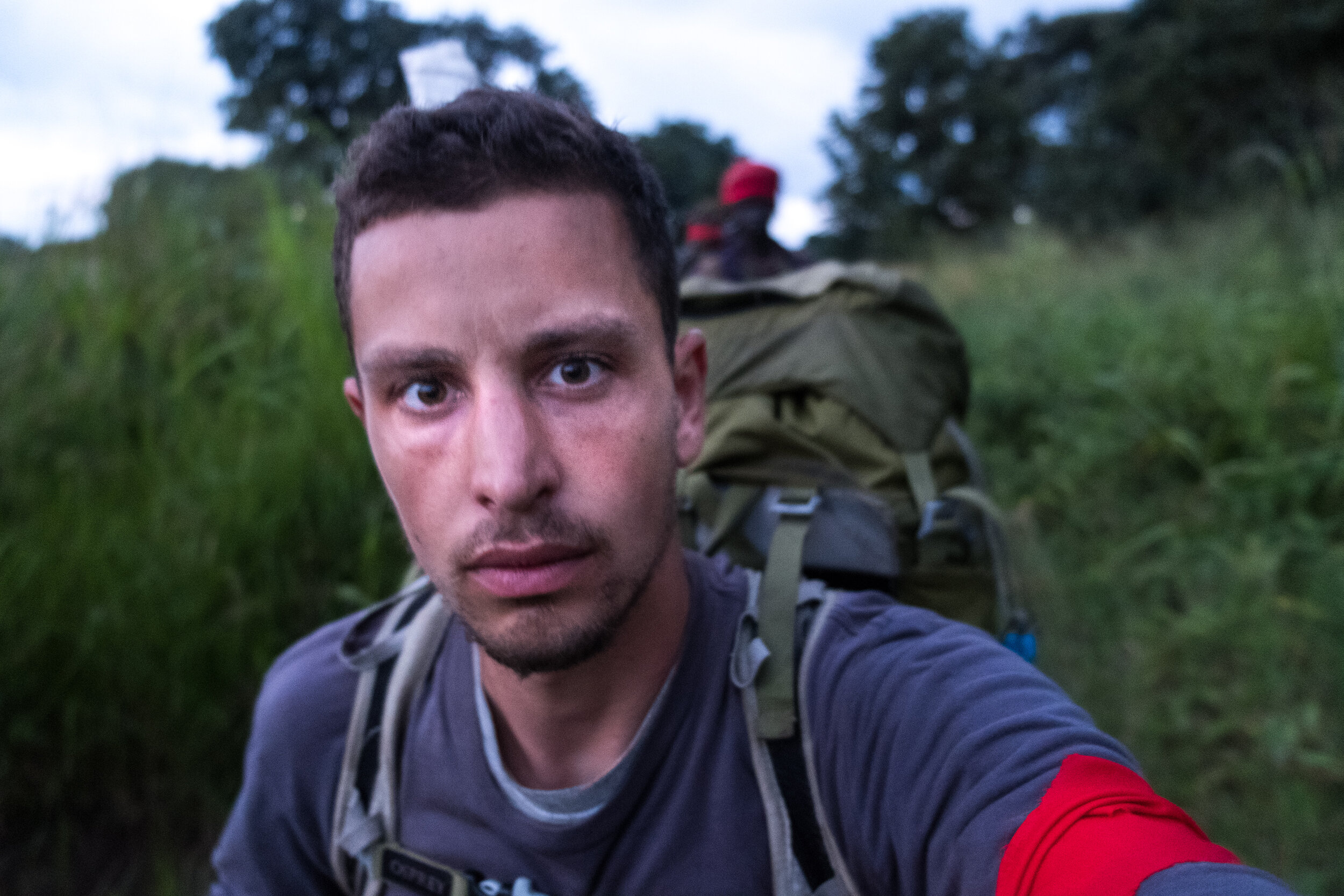
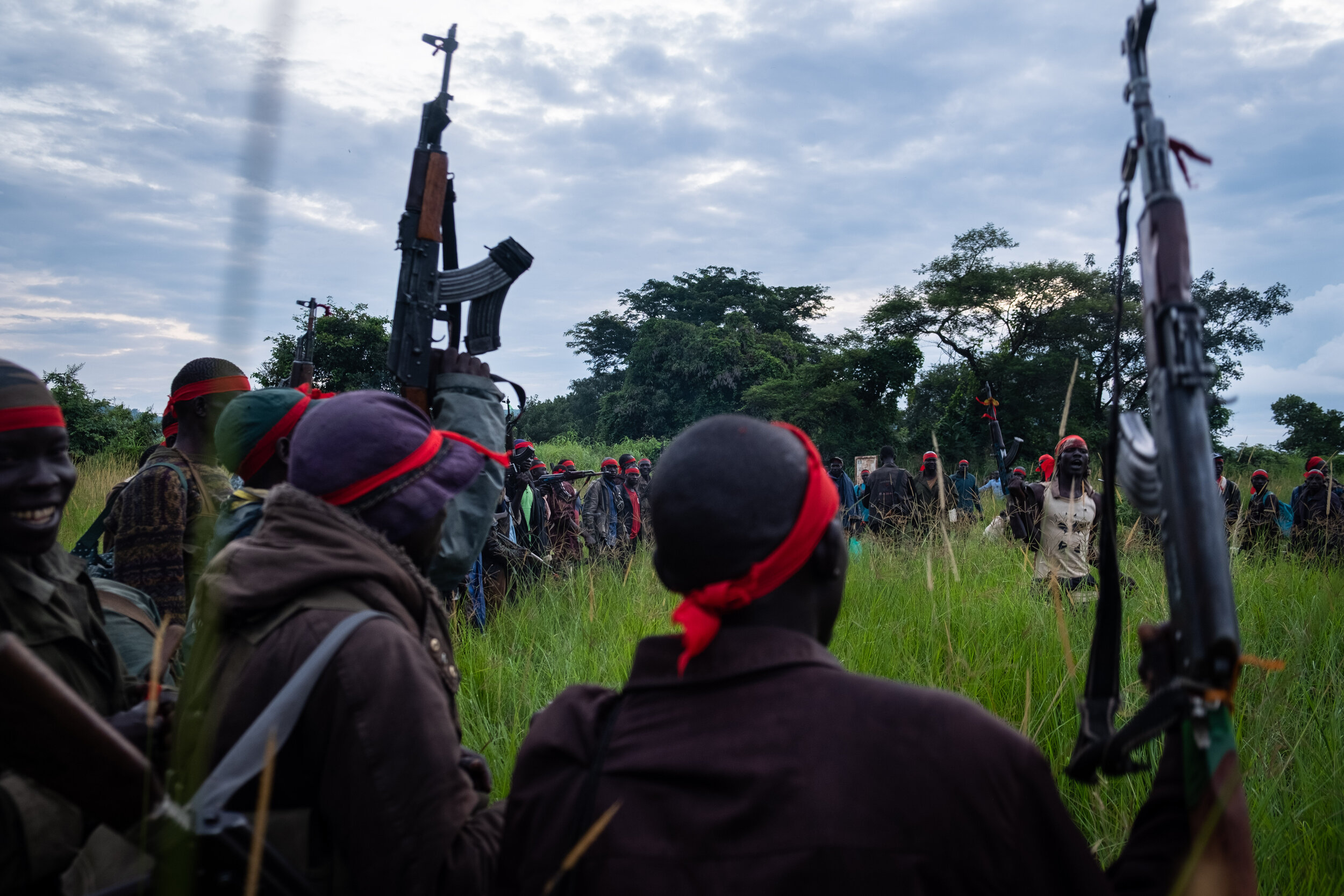
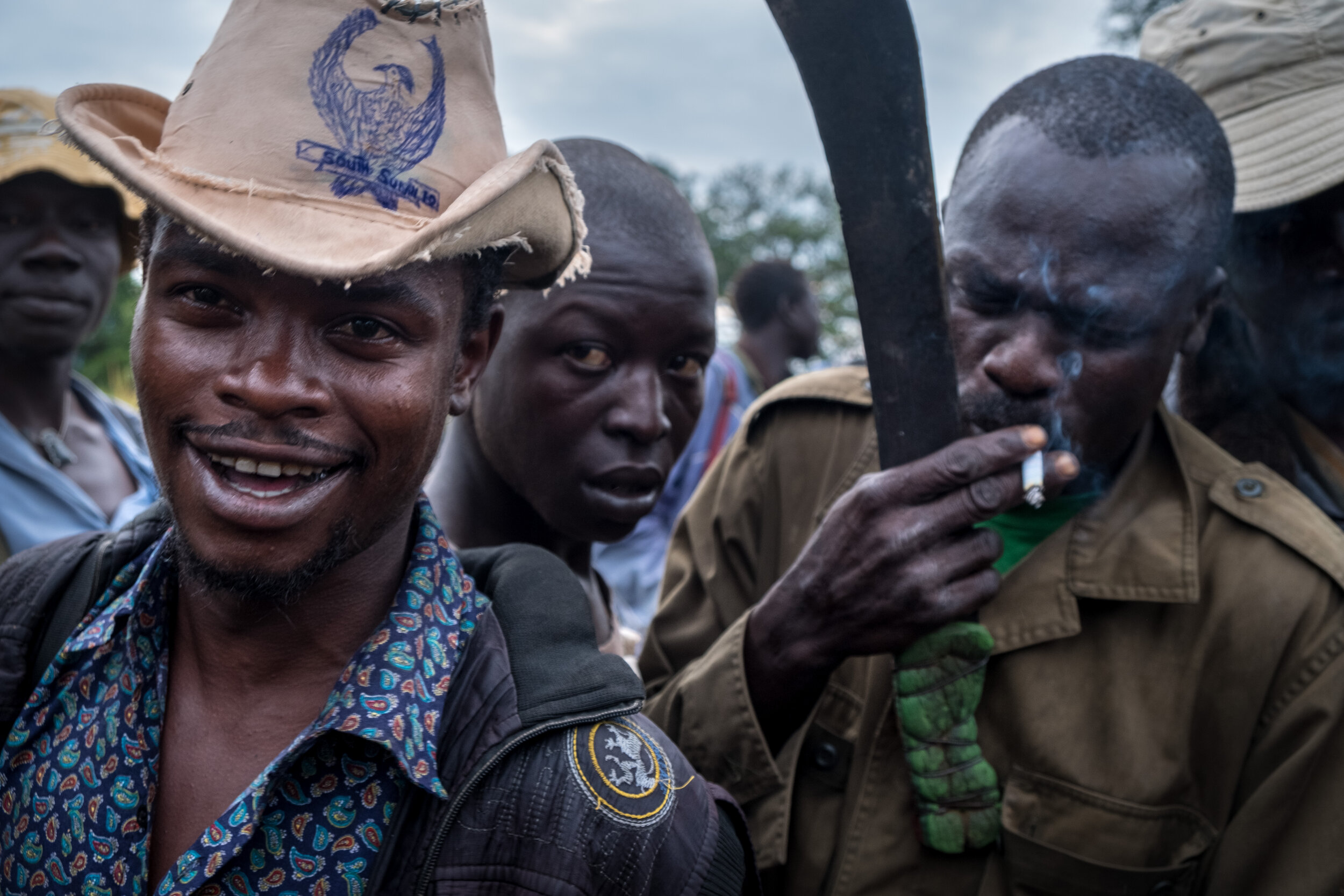
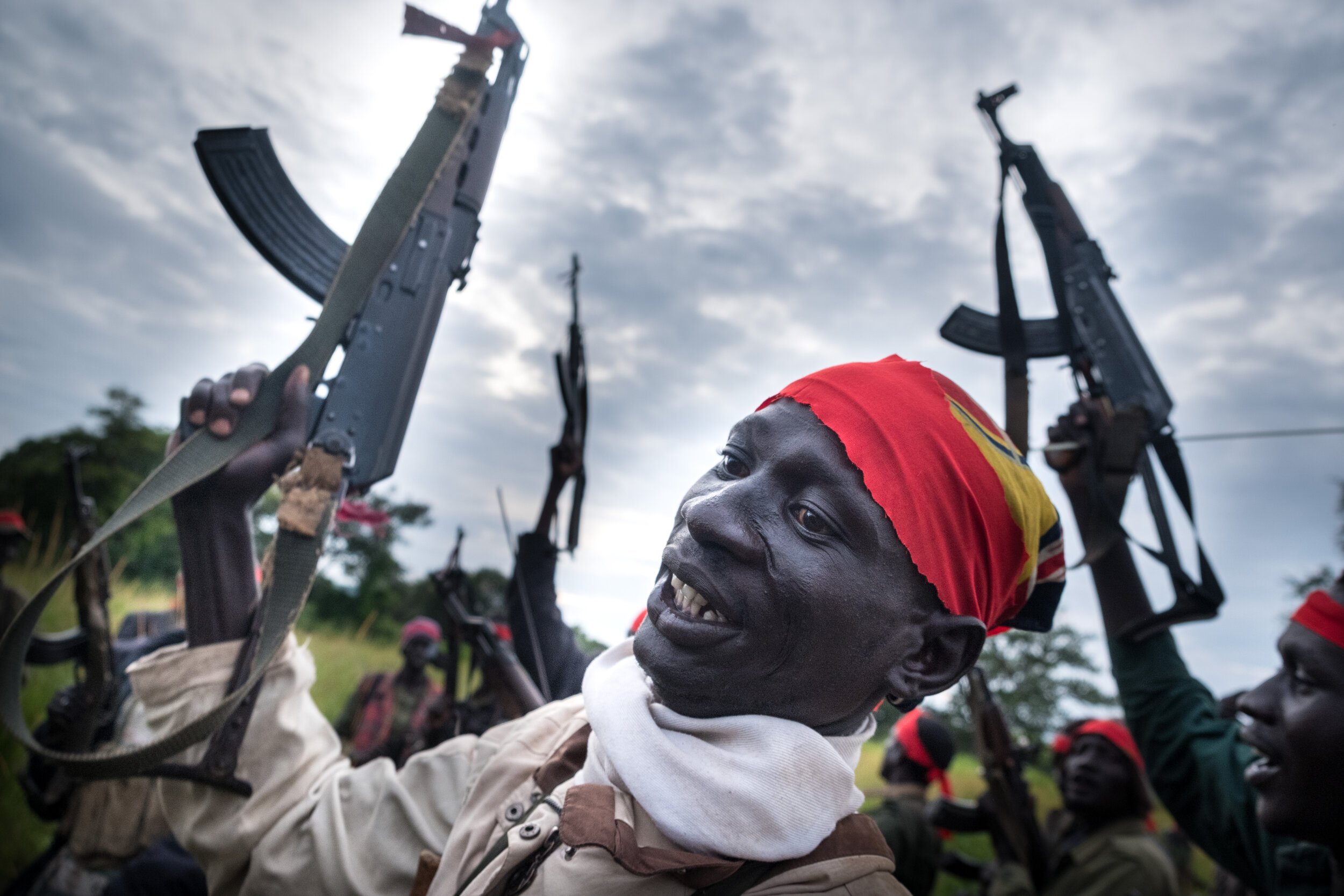
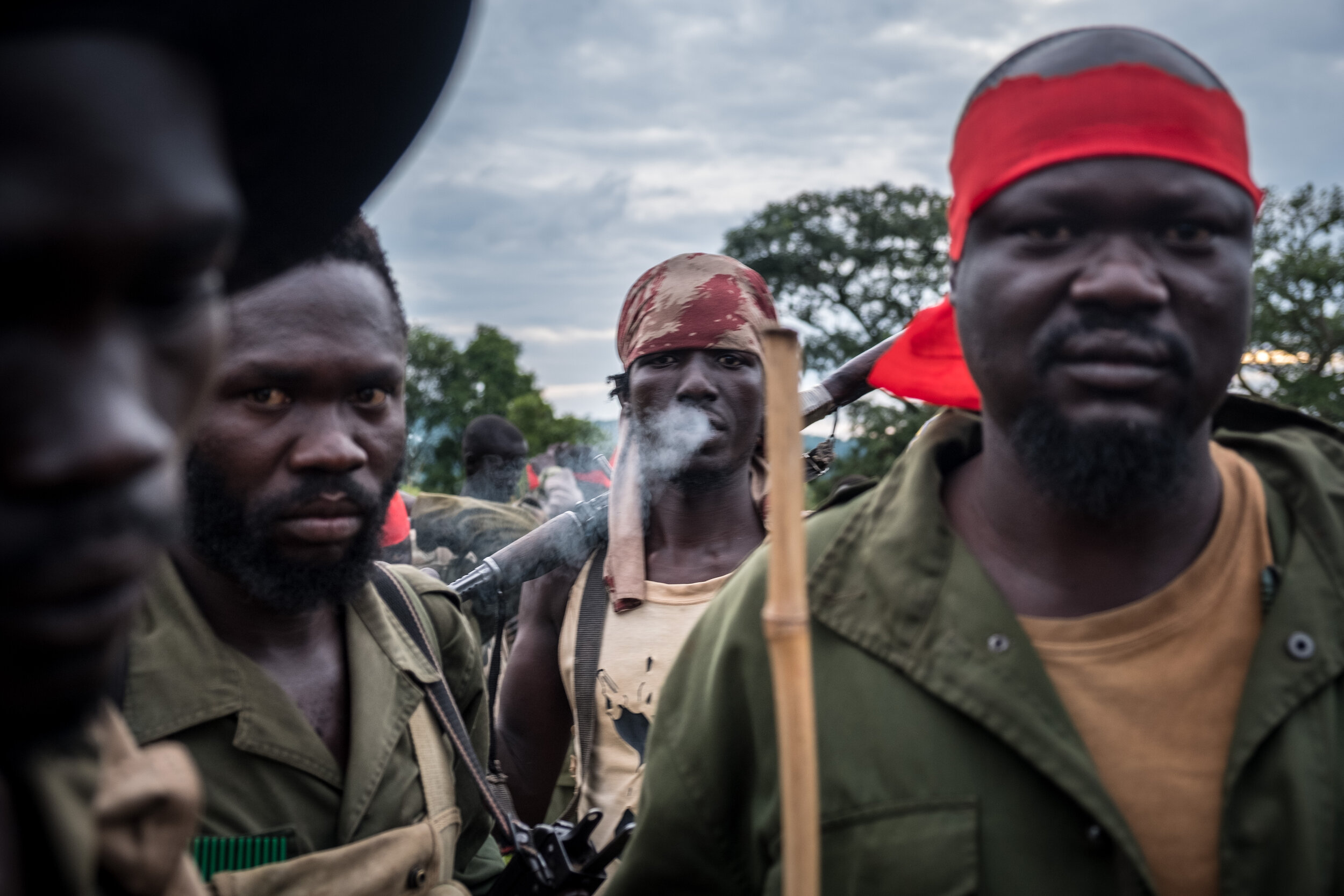
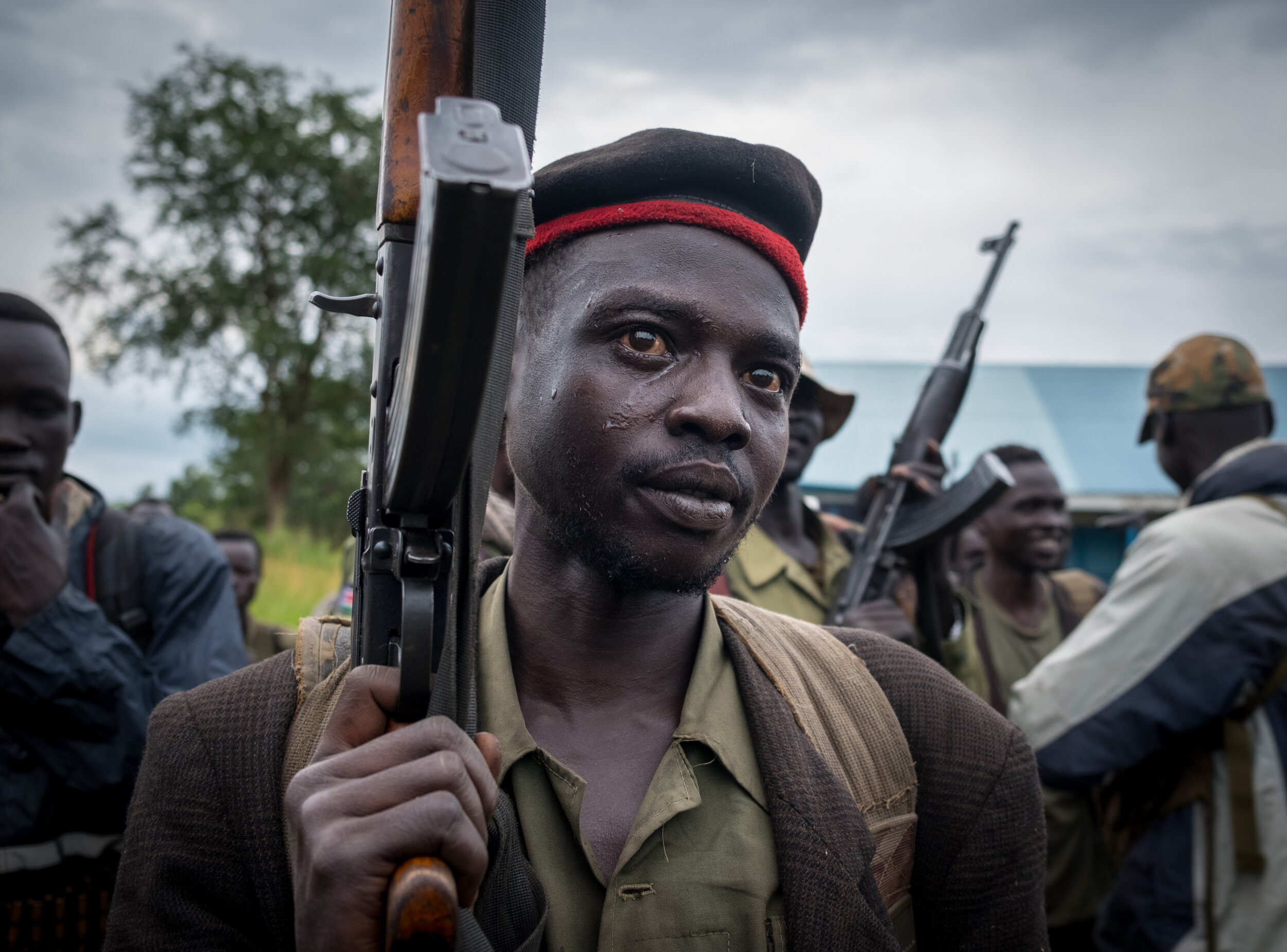
This is also a spiritual place. Last night late, it was dark but the full moon was so bright that it lit up the huts and drew the field in shadows.
When it rains, as it does often massive grey clouds race rapidly across the sky, dropping grey sheets of rain beneath them. With such a big sky and open landscape, you can see the flashes of lightning which cut the sky and the thunder that sounds like artillery (of which, ironically, there is almost none in this war). These are the storms of a wild, untamed world in which it is clear that nature has the definitive upper hand against man (in any uniform in which he might appear).
When the sky is clear at night and the moon isn’t too bright you can see all the stars – the heavens seem so close, as if you could catch them with a net. I’m reminded of trips to the planetarium when I was a kid, where all those bright starts envelop you in that immersive dome just out of reach.
26-8-2017
It went from daylight to darkness quickly and soon a sliver of moon had risen amongst heavy clouds. From dancing to darkness had taken only an hour. Now, we followed the silhouettes in front of us through the tall grass, down through the silent valleys with their heavy air, and then up again where a cool breeze from the approaching storm made the grasses sway. It was silent except for the footsteps of 20 men. Dark, except for the moon, hidden now by clouds.
There was just the silhouette of the man in front - dark and slim….
— End of Field Notes











































